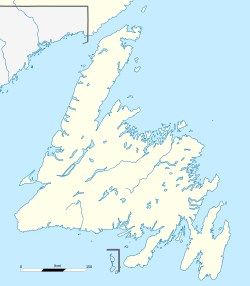Harbor Grace
| Harbour Grace | ||
|---|---|---|
| Town | ||

Harbour Grace water front ca. 1911
|
||
|
||
| Location of Harbour Grace in Newfoundland | ||
| Coordinates: 47°41′N 53°15′W / 47.683°N 53.250°W | ||
| Country |
|
|
| Province |
|
|
| Settled | 1610 | |
| Incorporated | July 10, 1945 | |
| Government | ||
| • Type | Harbour Grace Town Council | |
| • Mayor | Terry Barnes | |
| Area | ||
| • Total | 33.71 km2 (13.02 sq mi) | |
| Elevation | 16 m (52 ft) | |
| Population (2016) | ||
| • Total | 2,995 | |
| • Density | 88.8/km2 (230/sq mi) | |
| Time zone | Newfoundland Time (UTC-3:30) | |
| • Summer (DST) | Newfoundland Daylight (UTC-2:30) | |
| Postal code span | A0A | |
| Area code(s) | 709 | |
| Highways | Route 70 | |
| Website | Harbour Grace official site | |
Harbour Grace is a town in Conception Bay on the Avalon Peninsula in the province of Newfoundland and Labrador, Canada. With roots dating back to the sixteenth century, it is one of the oldest towns in North America. It is located about 45 km northwest of the provincial capital, St. John's. The town has a population of 3,074 (2006), engaged primarily in fishing and fish processing.
The alternative spelling Harbor Grace was current at one time.
Harbour Grace was an important port and fishing centre from the earliest days of European exploration of North America and was a thriving seasonal fishing community by 1550, with permanent settlement beginning in 1583 (24 years before the Jamestown, Virginia colony, often incorrectly cited as the first permanent European settlement in North America, and two years before the "lost" colony at Roanoke, North Carolina). The first year-round settler that year was Robert Tossey of Dartmouth, England. The town was named after Havre de Grâce (now Le Havre), France, although it is uncertain whether the name was given by French cartographers, Francis I of France, or early settlers from the British Channel Islands and West Country who were familiar with Le Havre as a common trade destination for fishermen from the Channel Islands.
In 1610, pirate Peter Easton made Harbour Grace his headquarters, and established a fort overlooking the bay. Although it was attacked by the French the following year, the early settlement survived throughout the seventeenth century, with a permanent, year-round population numbering a few dozen, swelling to several hundred during the fishing season. In 1618, Bristol's Society of Merchant Venturers received a charter from King James I of England to establish a settlement near Harbour Grace, "Bristol's Hope", and appointed Robert Hayman as its first Proprietary Governor, a post he held for the next ten years. Back in London at the end of this period in 1628 Hayman published a work of pithy epigrams called Quodlibets which he had written in Harbour Grace — it was the first book written in the new world. The Conception Bay area is referred to in the subtitle of his book not as "Conception Bay" but by its original, though now largely forgotten, name of "New Britanolia".
...
Wikipedia


